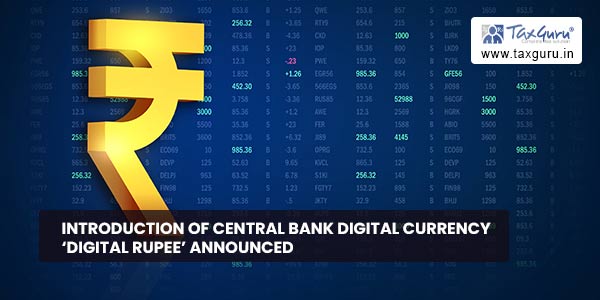INTRODUCTION OF CENTRAL BANK DIGITAL CURRENCY ‘DIGITAL RUPEE’ ANNOUNCED
75 DIGITAL BANKING UNITS TO BE SETUP IN 75 DISTRICTS BY SCHEDULED COMMERCIAL BANKS
100 PER CENT OF 1.5 LAKH POST OFFICES TO BE BROUGHT ON THE CORE BANKING SYSTEM IN 2022
FINANCIAL SUPPORT FOR DIGITAL PAYMENT ECOSYSTEM TO CONTINUE
The Minister for Finance & Corporate Affairs, Smt Nirmala Sitharaman today announced the introduction of Digital Rupee to be issued by the Reserve Bank of India starting 2022-23. Presenting the Union Budget 2022-23 in the Parliament here today, the Finance Minister said that the Central Bank Digital Currency (CBDC) will give a big boost to digital economy. Digital currency will also lead to a more efficient and cheaper currency management system, the Minister stated. The Digital Currency will use block chain and other technologies.

Digital Banking:
Smt Nirmala Sitharaman said that in recent years, digital banking, digital payments and fintech innovations have grown at a rapid pace in the country. Government is continuously encouraging these sectors to ensure that the benefits of digital banking reach every nook and corner of the country in a consumer-friendly manner. Taking forward this agenda, and to mark 75 years of our independence, the Finance Minister announced that it is proposed to set up 75 Digital Banking Units (DBUs) in 75 districts of the country by Scheduled Commercial Banks.

Anytime- Anywhere Post Office Savings:
In another important announcement, the Finance Minister said that in 2022, 100 per cent of 1.5 lakh post offices will come on the core banking system enabling financial inclusion and access to accounts through net banking, mobile banking, ATMs, and also provide online transfer of funds between post office accounts and bank accounts. This will be helpful, especially for farmers and senior citizens in rural areas, enabling interoperability and financial inclusion.
Digital Payment:
The Finance Minister assured that the financial support for digital payment ecosystem announced in the previous Budget will continue in 2022-23. This will encourage further adoption of digital payments. There will also be a focus to promote use of payment platforms that are economical and user friendly, she said.




